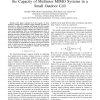Free Online Productivity Tools
i2Speak
i2Symbol
i2OCR
iTex2Img
iWeb2Print
iWeb2Shot
i2Type
iPdf2Split
iPdf2Merge
i2Bopomofo
i2Arabic
i2Style
i2Image
i2PDF
iLatex2Rtf
Sci2ools
VTC
2006
IEEE
2006
IEEE
The Effect of Computation and Feedback Delay on the Capacity of Multiuser MIMO Systems in a Small Outdoor Cell
— This paper examines how the capacity of three multiuser multiple-input multiple-output (MIMO) algorithms is affected by a delay in computing and feeding back the transmit (and receive) weighting matrices used by the algorithms. Iterative schemes determining transmit weights that achieve the systemwide Nash Equilibrium (NE) or block-diagonalization (BD) of the overall system channel matrix are compared as is a scheme applying successive diagonalization (SD) among users. The NE is found to be far the most robust to out-of-date channel information, whilst SD is found to suffer badly at even the shortest delay considered here (about 0.9ms); BD’s losses vary over a wide range depending on the delay. For the two iterative algorithms we also examine the tradeoff between better convergence and less delay. In both cases, the loss in capacity for weaker convergence is very small, and so it is desirable to minimize the delay and thus the capacity loss caused by it.
| Added | 12 Jun 2010 |
| Updated | 12 Jun 2010 |
| Type | Conference |
| Year | 2006 |
| Where | VTC |
| Authors | Matthew Webb, Mythri Hunukumbure, Mark A. Beach, Andrew R. Nix |
Comments (0)

